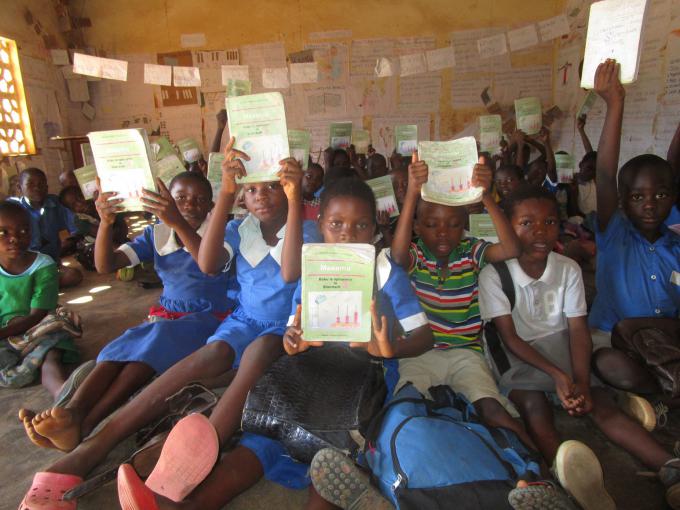Math textbooks bring joy to students and teachers in Mwanza
9-year-old Emilida was all smiles after receiving a Math textbook from her teacher at Mphande Primary School in Mphande Education zone, Mwanza District. Her face shone brightly with joy even when chatting with her fellow grade 3 friends under a tree during break time.
“I am really happy to have a Math textbook which I can take home. Previously, I had problems practicing mathematics at home and doing homework because I had no textbook,” she explains. Emilida and her two siblings live with their parents in Nchotseni village, Senior Traditional Authority Kanduku in Mwanza district, southern Malawi. Her parents run a very small scale business to earn a living. They sell homemade maize flour cakes.
“My parents could not afford to buy me any text books as their income is very small,” Emilida told her friends.
On average, Emilia’s parents earn $0.50 a day from the business from which the family barely survives. They can hardly afford to satisfy their basic needs let alone scholastic materials such as textbooks for their children. The price of this math book, $2.11, represents over 4 days of income for the family
Mwanza is one of the districts in Malawi with a significant shortage of textbooks. For instance, in the 2016/17 academic year, the district had a total of 6,667 learners in grade 3 and 5,466 learners in grade 4 against a total Math textbook inventory of 4,327 in grade 3 and 3,971 in grade 4. This amounts to a textbook shortage of 35% in grade 3 and 27% in grade 4.
“It was hard to keep borrowing a Math textbook. If you were lucky, the teacher would lend you a book just for one day. This made learning very difficult,” Emilida recalls.
Emilida’s teacher, Anne Pious, says the situation was really bad before the NORAD-supported project started to distribute Math text books in October 2017.
“Emilida had problems with addition of numbers using an abacus but since she was given the Math textbook, there has been a remarkable improvement of her performance,” the teacher points out.
Emilida’s sister who is in grade 6 has also been helping her at home. The combination of a book and the sister’s support is paying dividends, her teacher adds.
“I am happy to tell you that during the last weekly Math test, I scored 92% compared to 34% in the previous test. I now always reserve time for math practice and homework,” Emilida says proudly with a broad smile on her face.
Mr Joseph Tsikulimodzi, the school’s head teacher, says that the provision of Math textbooks to schools came at the right time as teachers had long been facing challenges teaching large classes with few textbooks.
“We now breathe a sigh of relief and are hopeful that we will see improvements in numeracy learning outcomes at the end of this academic year,” the head teacher commented optimistically.
Another teacher concurs with him, stating “I had 24 Math textbooks for a total enrolment of 74 learners in my class. Teaching Math wasn’t easy. I was being forced to put learners in large groups due to the limited number of textbooks. Now things have changed for the better. I have 74 Math textbooks – one for each learner. Teaching has been made a lot easier and I can put learners in small groups with a maximum of 5 learners per group.”
The distribution of text books at Mphande primary school has been key to enhancing learning outcomes. This intervention was undertaken by Save the Children in partnership with the Association of Progressive Women (APW). It forms one activity within a project known as the Quality Learning and Accountability (QLA) Project. Supported by the Norwegian Agency for Development Cooperation (NORAD), the QLA project started in January 2015 in Mwanza and Neno districts. The project seeks to advance the Malawi government’s agenda to enhance children's learning and development as well as the improvement of the governance infrastructure.
 Malawi
Malawi 